Organisational Analysis: Paradigms, Criticisms, and Practicality
Added on 2023-06-14
27 Pages2337 Words92 Views
Organisational Analysis
Assignment 1
Name
Student ID
Assignment 1
Name
Student ID
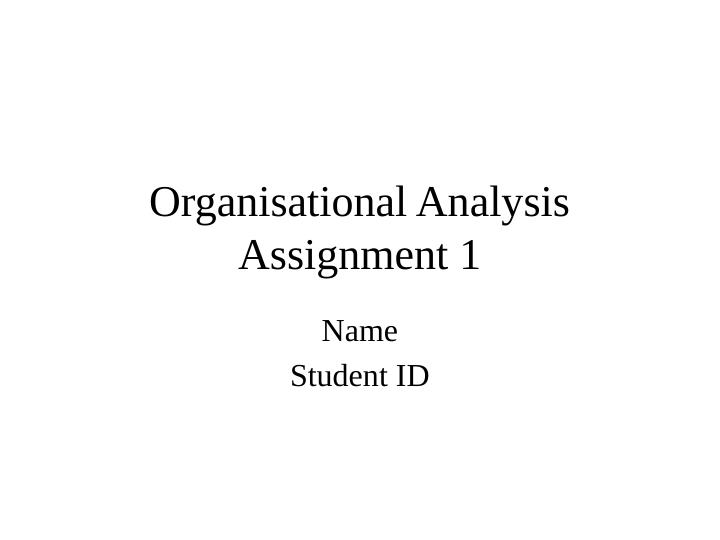
Classification of paradigms
• Four different paradigms of information are used
in system development classification due to the
fusion of these factors: fundamental change&
adjustment and facilitator & subjectivism Burrell
and Morgan (1982).
• Original change is defined as the fact that the mean
fundamental changes to the standard order on
things conducted on organization considered ought
to be, while control point of view is primarily and
judgmentally less.
• Four different paradigms of information are used
in system development classification due to the
fusion of these factors: fundamental change&
adjustment and facilitator & subjectivism Burrell
and Morgan (1982).
• Original change is defined as the fact that the mean
fundamental changes to the standard order on
things conducted on organization considered ought
to be, while control point of view is primarily and
judgmentally less.
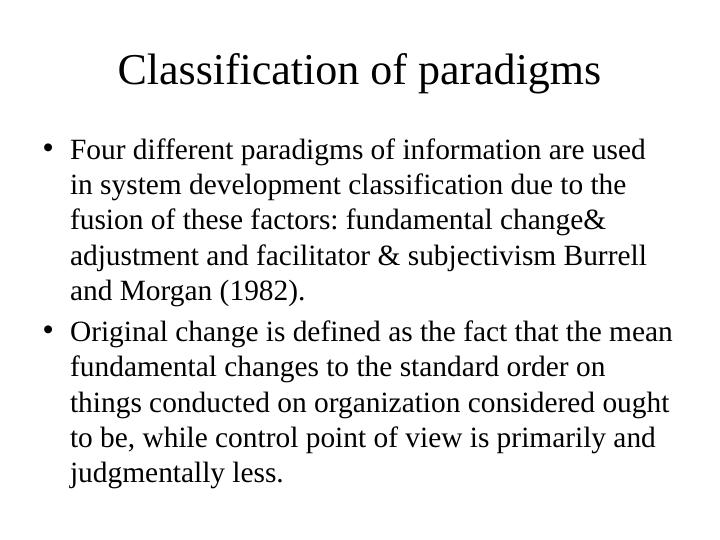
Paradigm selection
• Paradigm 1
Radical structuralism
• Paradigm 2
Functionalism
• Paradigm 1
Radical structuralism
• Paradigm 2
Functionalism
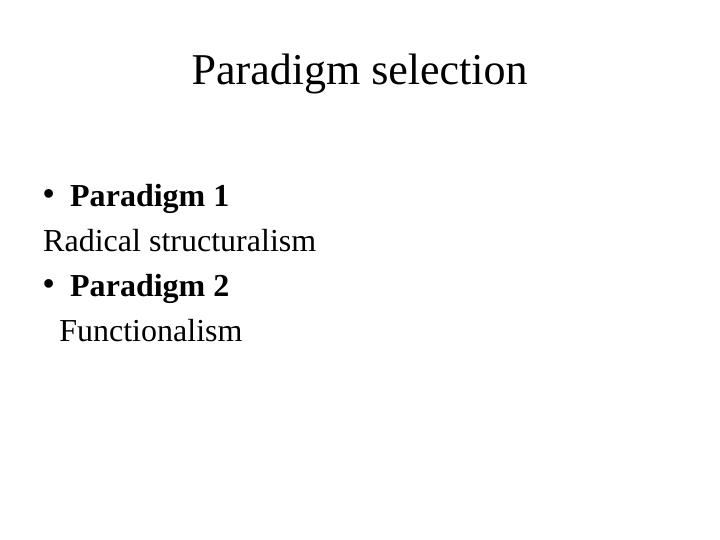
Criterion based on facilitator and
subjectivist point of view
• The subjectivist model as discussed by Klein and
Hirschheim (1989)
• The viewpoint of nominalist philosophers: they state
that there are diverse contexts of values, beliefs, and
experiences together with valid perspectives that are
subjectively constructed via people’s reality
• On an interpretive philosophers epistemology: they
say people need to understand the way in which the
world is interpreted and also consider that relativistic,
questions the existence of “objective” knowledge.
subjectivist point of view
• The subjectivist model as discussed by Klein and
Hirschheim (1989)
• The viewpoint of nominalist philosophers: they state
that there are diverse contexts of values, beliefs, and
experiences together with valid perspectives that are
subjectively constructed via people’s reality
• On an interpretive philosophers epistemology: they
say people need to understand the way in which the
world is interpreted and also consider that relativistic,
questions the existence of “objective” knowledge.
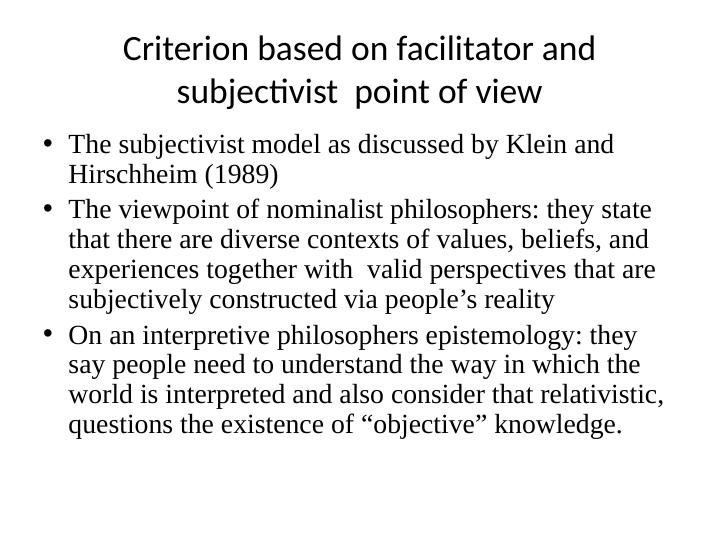
Social Relativism
• Systems Development is seen as sensemaking
• The analyst is deemed as the facilitator
• The knowledge collected and applied here is a
• Development of systems and processes is
subjective and is customarily ordered
• There is also evolutionary social transformation
• Development of methods is process oriented and
a negotiated reality with management and users.
• Systems Development is seen as sensemaking
• The analyst is deemed as the facilitator
• The knowledge collected and applied here is a
• Development of systems and processes is
subjective and is customarily ordered
• There is also evolutionary social transformation
• Development of methods is process oriented and
a negotiated reality with management and users.
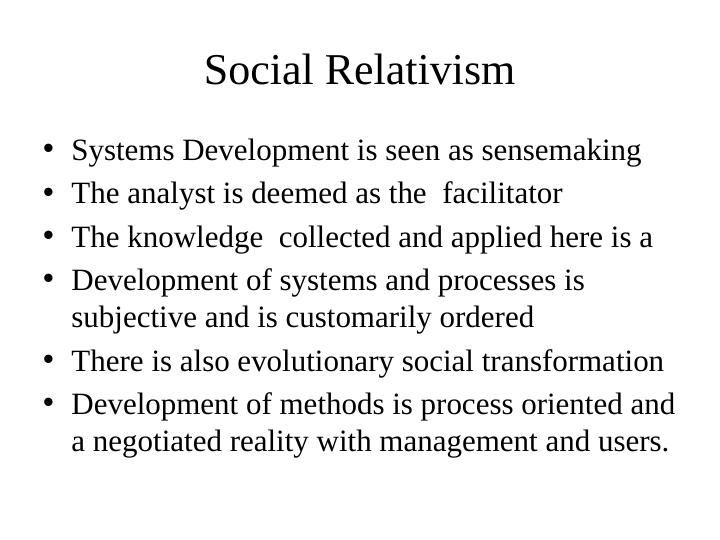
Types of social objectivity
• Descriptive Relativism is based on, comprehensive and
deeply rooted moral disagreements across different
societies that are factually proven. The existence of natural
disputes about accepted procedures is clearly accepted by
the descriptive moral relativism, when the same outcome
seems to come up, and the same information may be
realized too.
• Meta-Ethical Relativism holds that acceptance or rejection
or of moral judgments is relative to the beliefs, culture or
practices of a specific society not absolute or universal, It
also holds that many moral contention lack authority and
cannot be resolved rationally .
• Descriptive Relativism is based on, comprehensive and
deeply rooted moral disagreements across different
societies that are factually proven. The existence of natural
disputes about accepted procedures is clearly accepted by
the descriptive moral relativism, when the same outcome
seems to come up, and the same information may be
realized too.
• Meta-Ethical Relativism holds that acceptance or rejection
or of moral judgments is relative to the beliefs, culture or
practices of a specific society not absolute or universal, It
also holds that many moral contention lack authority and
cannot be resolved rationally .
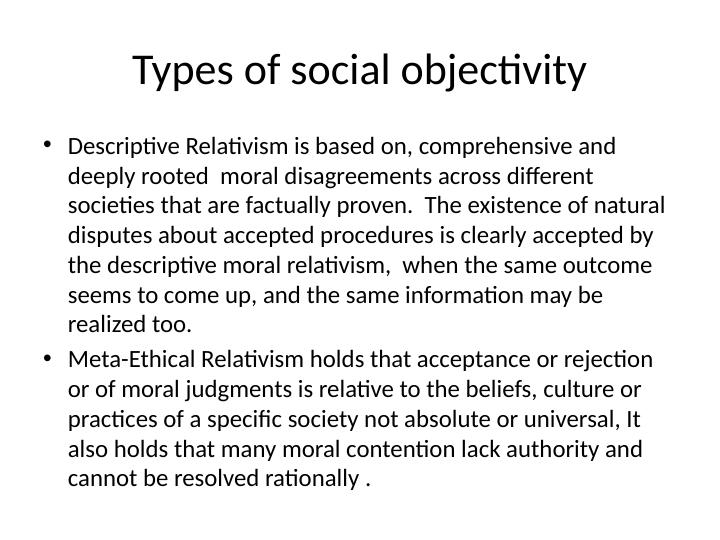
End of preview
Want to access all the pages? Upload your documents or become a member.
